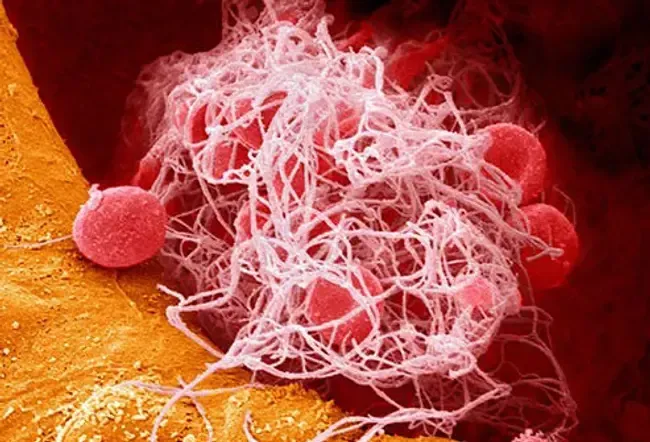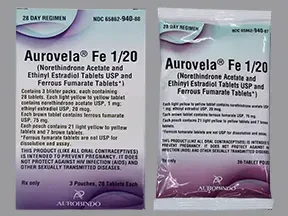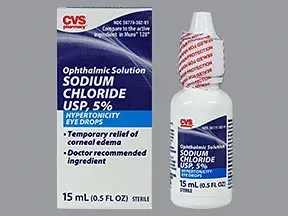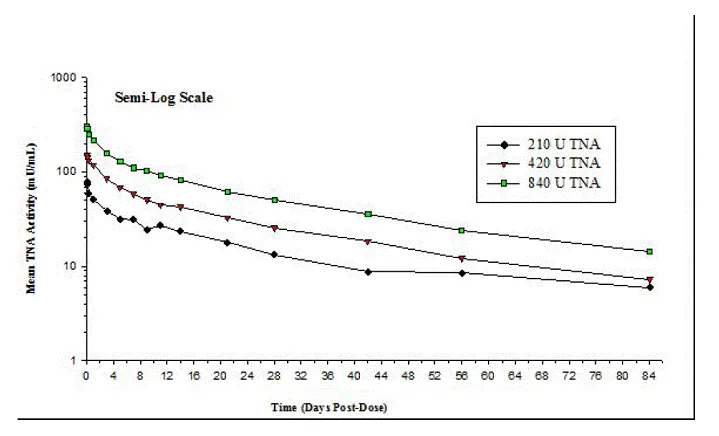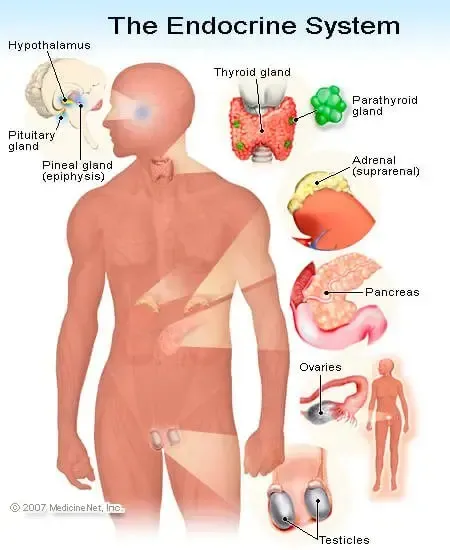Hernias: Causes, Types, and Treatments
The Information On The Site Is Not Medical Advice. We Do Not Sell Anything. The Accuracy Of The Translation Is Not Guaranteed. Disclaimer
What Is a Hernia?

Even if you don't have six-pack abs your belly still has walls of muscle that support you help you move and hold things in place inside you. A hernia happens when part of your body squeezes through a weak spot or opening in a muscle wall. It's like an inner tube bulging through a hole in a worn-out tire. You can get different kinds of hernias but most of them happen somewhere between your hips and chest.
Symptoms
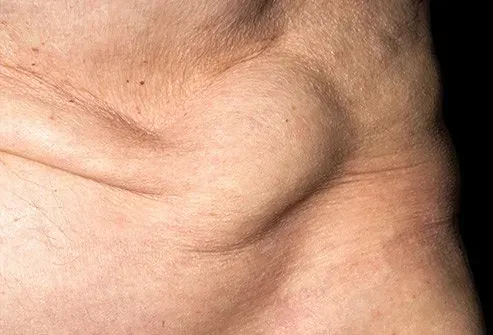
Typically hernias don't hurt -- you see a bulge or lump in your belly or groin. Sometimes you only see the bulge when you laugh cough or strain like when you lift a heavy object. Often you can press it back into place. You may also notice:
- The bulge gets bigger over time.
- You have a feeling of fullness.
- Pain pressure or a dull ache around the bulge
- Pain when you lift something
Inguinal Hernias
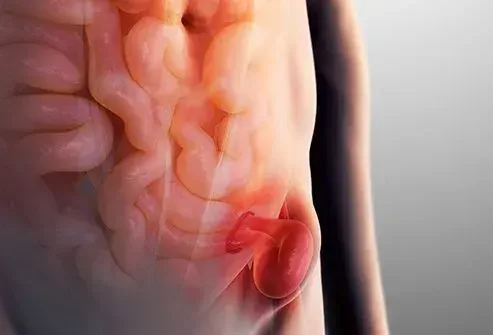
This is the most common kind of hernia. It happens most often in men but women sometimes get them during pregnancy. It's when fat or a loop of intestine pushes into your groin through a weakness in your lower belly. You may be born with it or the problem can come with:
- Age as muscles shrink over time
- Chronic coughing as with someone who smokes
- Strain from physical activity or going to the bathroom
Femoral Hernia
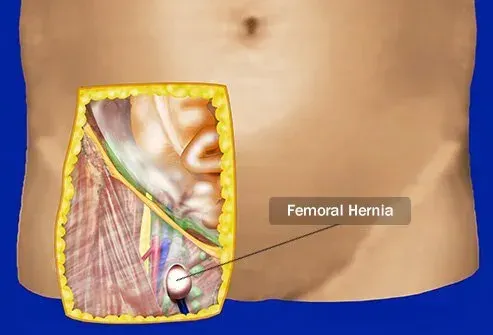
These are like inguinal hernias but in a different part of the groin. Women are more likely to get them. They're not common but they can be dangerous -- you may not notice any symptoms unless a muscle squeezes the hole shut while the intestine is poking through (called strangulation). In that case the lump will be hard and tender and you might have severe belly pain nausea or vomiting. If you have these symptoms get medical help right away.
Ventral Hernias
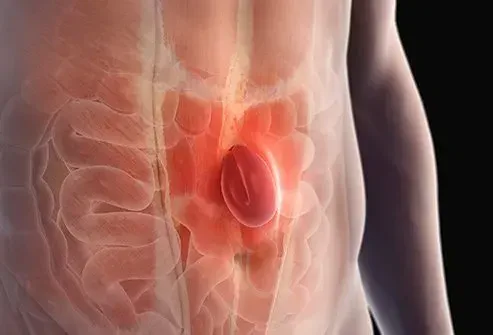
You get these hernias between your belly button and chest when some tissue or intestine pops through your belly's muscles. You may be more likely to get one if you:
- Are very overweight
- Have a cough that doesn't go away
- Lift heavy objects like with construction work
- Strain hard when you go the bathroom
- Throw up often
Incisional Hernias
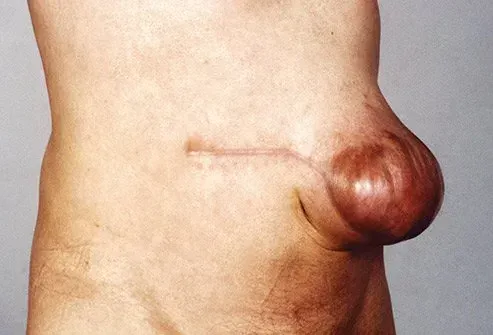
Incisional hernias are fairly common for people who've had surgery on their bellies. They happen when tissue squeezes through the surgery wound before it totally heals. You're more likely to get one if you run into problems as you heal like an infection. The only way to fix them is with another surgery but they're often hard to treat.
Hiatal Hernias
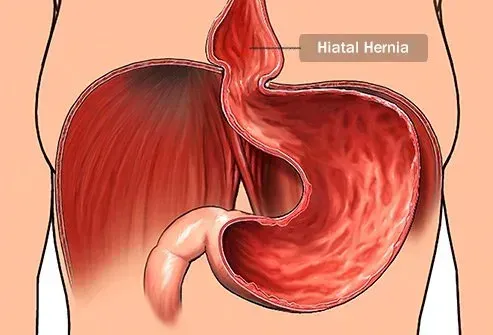
With this kind of hernia part of your stomach pops through your diaphragm and into your chest. (Your diaphragm is a sheet of muscle between your belly and chest.) You won't see a bulge but you might get heartburn chest pain and a sour taste in your mouth. People 50 and older and pregnant women are more likely to have them. Pregnancy can put pressure on the belly and weaken its muscles. They're typically treated with medication and lifestyle changes like having several smaller meals rather than three large ones or not lying down within 3 hours of eating.
Hernias in Children
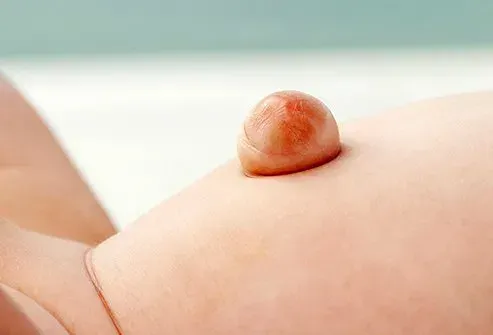
When kids get hernias they're typically inguinal or umbilical hernias. Inguinal hernias are most common in babies born early and in boys born with a testicle that hasn't dropped into the scrotum. Umbilical hernias happen right around the belly button. They don't usually hurt and may just look like an outie belly button. They often go back into place on their own by age 2.
When to See a Doctor
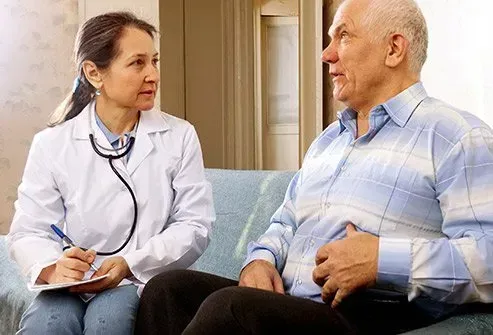
While a hernia may start out as a harmless bulge it can get bigger and start to hurt. In some cases it can even be life-threatening. So even if it doesn't seem like a big deal it's best to see your doctor if you have symptoms of a hernia like a lump or bulge you can't explain.
When to Go to the Emergency Room
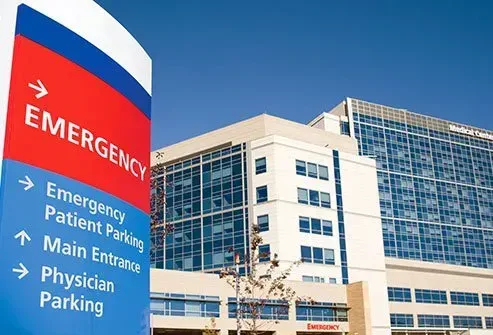
If a loop of intestine gets trapped in a hernia you have a serious problem called incarceration. It blocks the flow of waste through your body. If it's trapped tightly the intestine's blood flow can get cut off. Get help right away if you have a hernia and these symptoms:
- Bulge is dark purple or red.
- You can't pass gas or poop.
- You have a fever.
- Pain quickly gets worse.
- You're throwing up or have an upset stomach.
Tests
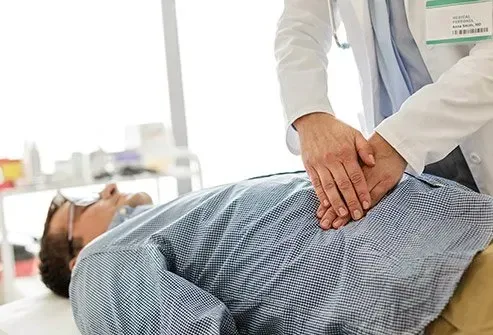
Most of the time your doctor can tell you have a hernia with just a physical exam. They may ask you to stand and cough to make the hernia easier to see but that's usually it. If your doctor's not totally sure you might have some imaging tests to get a better look. These might include:
- Ultrasound: High-frequency sound waves make an image of your internal organs.
- Computerized tomography (CT): X-rays are taken at different angles and put together to make a more complete picture.
- Magnetic resonance imaging (MRI): This uses a powerful magnet and radio waves to get a detailed view.
Treatment: Watchful Waiting
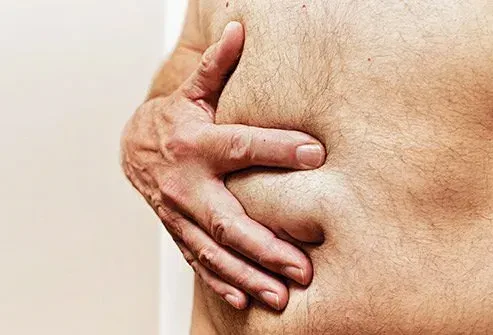
You don't always need to treat hernias. Umbilical hernias in kids may heal on their own so your doctor may suggest you wait until around age 4 for treatment. For adults especially if surgery could be risky for you your doctor may suggest just keeping an eye on it as long as the hernia's small and not causing any major problems for you.
Treatment: Surgery
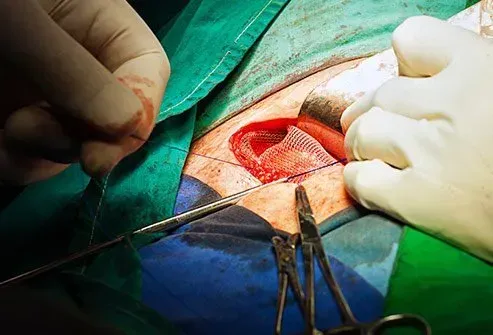
The most common treatment for any hernia is surgery to put in a mesh that helps support the wall around your belly. You may have open surgery where your doctor makes a long opening in your skin or you may get laparoscopic surgery which uses a few smaller openings. You may heal quicker from laparoscopic surgery but some studies show the hernia may be a little more likely to come back.
Can a Truss Help?
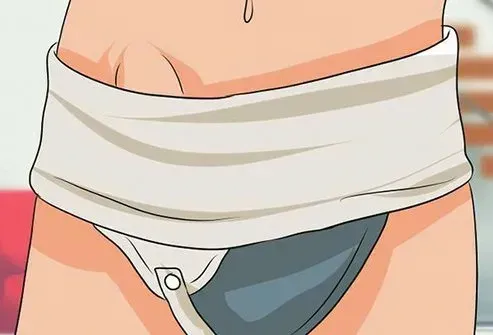
Not really. This cloth device that's worn like a binder around your middle or like underwear won't make you better. You may get one to wear for a short while after surgery -- it may make you more comfortable -- but that's likely the only time your doctor will suggest it. The same goes for tape bandages and anything else to hold a hernia in place -- they won't heal the hernia or prevent more serious problems.
How to Prevent a Hernia
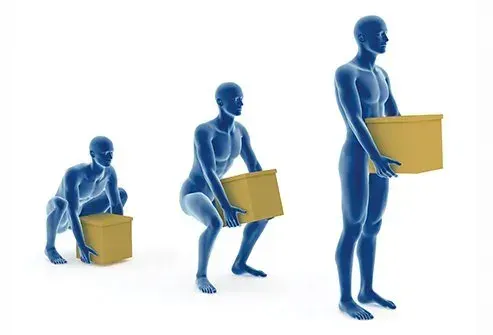
You can lower your odds of getting a hernia if you:
- Talk to your doctor if you have a cough or sneezing that won't go away. Quitting smoking helps.
- Eat fruits veggies and whole grains to keep yourself regular.
- Stay at a healthy weight with diet and exercise.
- Use good form when you do physical activity. For example when lifting a heavy object bend from your knees instead of your waist.
Hernias: Causes Types and Treatments
Sources: 
IMAGES PROVIDED BY:
- Science Picture Co / Science Source
- Dr P. Marazzi / Science Source
- Science Picture Co / Science Source
- F. D. Giddings / Medical Images
- Science Picture Co / Science Source
- BIOPHOTO ASSOCIATES / Getty Images
- Keith A Pavlik / Medical Images
- RUTH JENKINSON / Medical Images
- JackF / Getty Images
- Sandra Nicol / iStock Photos
- Westend61 / Getty Images
- Willowpix / Getty Images
- PhotoGraphyKM / Getty Images
- Wikivisual / Creative Commons
- angelhell / Getty Images
REFERENCES:
- NHS: 'Umbilical Hernia Repair' 'Hernia' 'Inguinal Hernia Repair' 'Hiatus Hernia' 'Femoral Hernia Repair.'
- Cleveland Clinic: 'Hernia' 'Hiatal Hernia.'
- Columbia University Department of Surgery: 'Hernia.'
- Merck Manual: 'Abdominal Wall Hernias.'
- Mayo Clinic: 'Inguinal Hernia.'
- Johns Hopkins Medicine Webcast: 'Hernia Treatment' 'Comprehensive Hernia Center.'
- Dartmouth-Hitchcock Medical Center: 'Ventral Hernia.'
- Mt. Sinai Beth Israel: 'Hernia Types.'
- The British Hernia Center: 'Hernia Overview.'
- KidsHealth For Teens: 'Hernias' For Parents: 'Hernias.'
This tool does not provide medical advice. See additional information: 
THIS TOOL DOES NOT PROVIDE MEDICAL ADVICE. It is intended for general informational purposes only and does not address individual circumstances. It is not a substitute for professional medical advice diagnosis or treatment and should not be relied on to make decisions about your health. Never ignore professional medical advice in seeking treatment because of something you have read on the Site. If you think you may have a medical emergency immediately call your doctor or dial 911.
© 1996-2025 WebMD LLC . All rights reserved.
Source slideshow on WebMD


